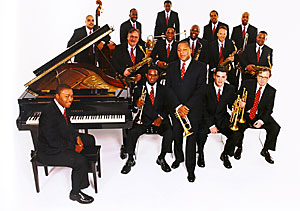 |
|
photo courtesy of JAZZ AT LINCOLN CENTER
|
LINCOLN CENTER JAZZ ORCHESTRA - Trumpeter/composer Wynton Marsalis will conduct the Lincoln Center Jazz Orchestra at Centennial Hall tonight at 7:30. Marsalis has distinguished himself as jazz's most resonant public voice and received the 1998 Pulitzer Prize for his composition "Blood on the Field."
|
|
|
By Kylee Dawson
Arizona Daily Wildcat
Thursday, January 20, 2005
Print this
Black History Month is just days away, and with it will come the merits, innovations and accomplishments of black people. One of the most illustrious gifts bestowed upon American culture, and the world, is jazz.
Since originating in New Orleans in the early 20th century, jazz has spread throughout the country, amassing a captivating history right up to the 21st century.
Pulitzer Prize-winning trumpeter Wynton Marsalis and the Lincoln Center Jazz Orchestra have tirelessly worked to sustain and revitalize jazz as we know it, while creating legions of new jazz lovers in the process.
The mission will continue tonight when Marsalis and the 15-piece orchestra perform at Centennial Hall. And Wessell "Warmdaddy" Anderson, who plays both alto and soprano saxophones in the LCJO, is one missionary helping to spread the love.
"All my favorite musicians are jazz musicians," Anderson said.
From Louis Armstrong to John Coltrane to Cannonball Adderly, Anderson finds no greater satisfaction in listening to his favorites, aside from performing the legendary music created and performed by his favorites.
"They created the music I love playing," Anderson said. "They're the greatest musicians in the world."
Though born and raised in the Bedford Stuyvesant and Crown Heights neighborhoods of Brooklyn, N.Y., Anderson currently calls Baton Rouge, La., home. Studying music in both states had a profound effect on how Anderson has developed as a musician over the years.
First influenced by his jazz drummer father, who clearly brought his work home, and later performing in "jazzmobile" workshops with the renowned saxophonist Frank Wess, jazz composer and arranger Frank Foster and tenor saxophonist Charles Davis, Anderson knew early on he wanted to become a musician and started with the piano.
"You're always developing," Anderson said, adding that such influences "laid the foundation."
Other influences include Miles Davis, Water Bishop Jr. and Sonny Stitt.
When Anderson found his true calling, he gave up the piano to play the sax for the same reason most musicians choose to become jazz musicians.
"Because of Charlie Parker," Anderson said. "When I heard him, I realized that's what I wanted to do."
Growing up in New York, Anderson said he got pointers from various musicians. The case was the same when he enrolled at Southern University in Georgia where he studied clarinet under the tutelage of the multitalented jazz artist Alvin Batiste.
"He just knew how to make you think as a musician," Anderson said, "how to perform, date your time, how to be a great performer, how to practice, how to organize your time ... That's when everything started coming together."
Anderson first met Wynton Marsalis in 1985 while he was still attending Southern University and A&M College in Baton Rouge. While Anderson was playing in a house band at the time, Marsalis invited him to play a gig in Cleveland.
After a week, Marsalis instructed Anderson to finish school then call him up when he was "ready."
After doing exactly that, Anderson did a preliminary audition before becoming a member of Wynton Marsalis' Septet in 1988. Once Marsalis disbanded the Septet in 1995, Anderson joined the LCJO, with whom he's been making marvelously composed and luminously improvised music ever since.
"Of course the septet is half the size, it's more intimate," Anderson said. "Playing with the orchestra, you get to perform with a lot of people. It's like being on a football team."
Wynton Marsalis and the LCJO perform at Centennial Hall tonight at 7:30.
In addition to original compositions by Duke Ellington, Count Basie, John Coltrane and Thelonious Monk, Anderson said the LCJO will perform original music composed by Wynton Marsalis, including his "Suite for Human Nature," which first premiered in December at the Lincoln Center in New York.
